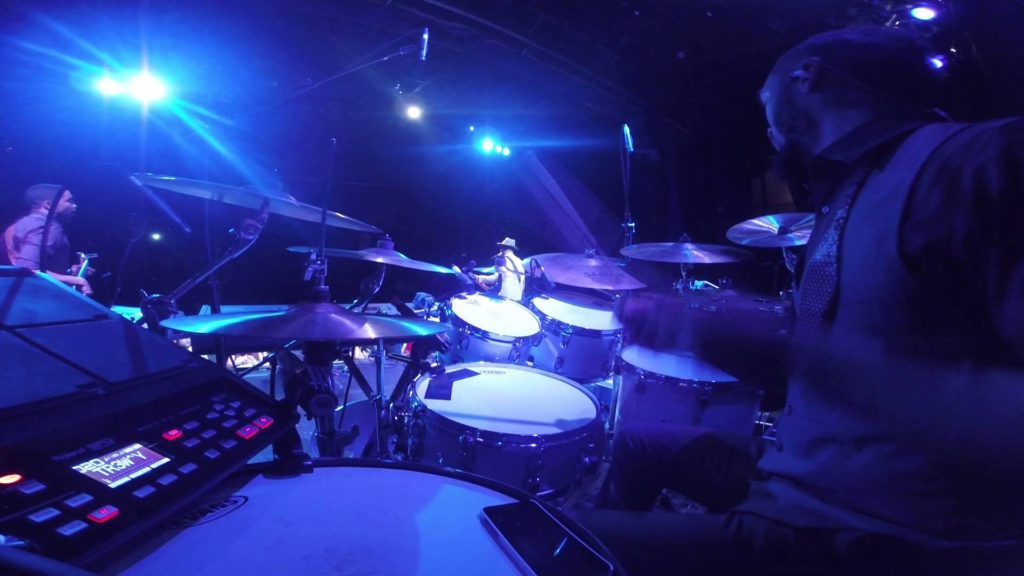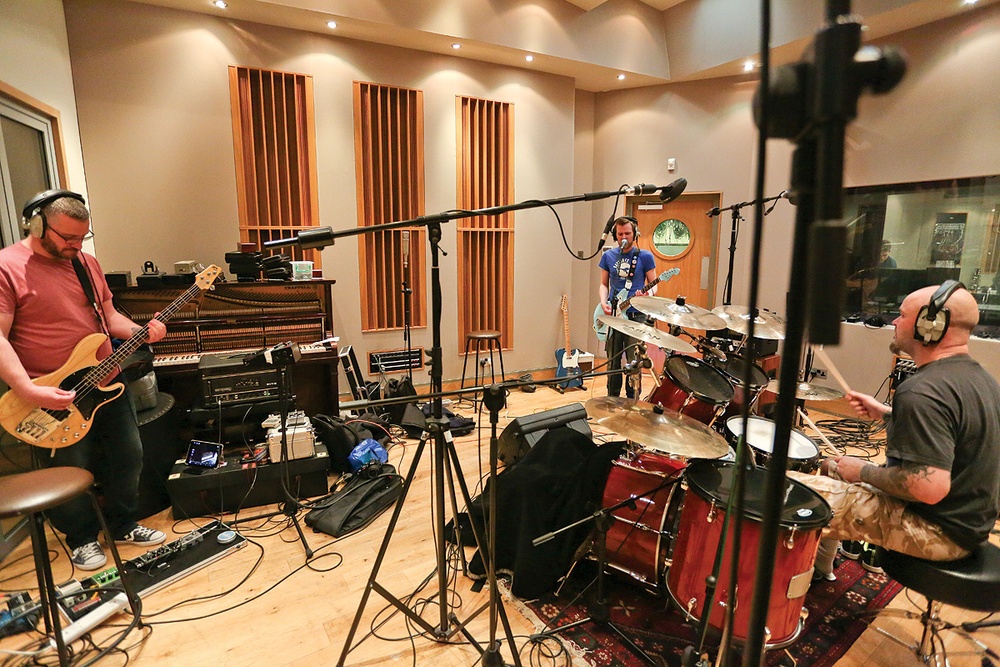By T. Perry Bowers
Playing drums on stage is very different from playing in your practice space or your mom’s basement.
Your practice space is a familiar environment, which you can manipulate to sound good every time you sit down to play. This is not the case when play stages. Every stage is different.
 Here are some tips to make you feel more at home:
Here are some tips to make you feel more at home:
- Spend time on your monitor mix
If you get a sound check, spend a little extra time on your monitor mix. You deserve to feel comfortable on stage. Make sure you have what you need in your stage mix: bass, vocal and kick drum. It can be the difference between a great gig and a crap one.
Unfortunately not all venues have great monitor systems, so you have to be flexible and work with what they have! Which brings us to point two …
- Be flexible
Unless you have your own sound people and you’re making a lot of money for the club, don’t act like a diva. Take the house sound guy’s advice and do as he says. He knows the room and what the club owners want. It’s not all about you.
If fifteen cymbals won’t fit on stage leave them at home. Nobody really cares how many drums you have. They care how well you play and how you back up the singer. Which brings us to point three …
- Back up the singer
Sure, some chicks really love the drummer. But most love the singer. The better you make him look, the better you’re going to look.
If you’re over-powering him with volume, stop it. If you’re playing fills over the top of a verse line, stop that too! If you’re a flashy drummer who needs a solo to express yourself, work with the band to find your place to shine. Or join a prog band.
Most bands need a drummer who will sit in the pocket and back up the singer. You can throw in some tasty licks here and there, but for the most part, dig the groove. Lock in with the bass. Listen to the band.
- Play for the song
The song is king. If the song is awful, your triplets in the bridge are wasted. Songs need dynamics. They need changes in intensity. Just because a song moves into the chorus doesn’t mean it requires a flashy fill.
Sometimes playing a little louder and grooving a little deeper is all that’s required.
If you’re playing drums in a band and the best thing you have going for you is the technical aspect of the drums, you need to find another band. If the song is great, find your spots to shine and play for the song.
- Take some time to tune your drums on stage
Especially in Minnesota, where I live, you need to let your drums adjust to the temperature and climate of the room. When you get to the venue, remove your kit from the cases and set them up. If you can, let them sit for a bit before giving them a final tweak.
- When you’re done, get off the stage
Unless you’re the final band of the night, remove your kit as soon as you’re done with your set.
Don’t break down all your drums on stage. Remove all the pieces immediately, then break your kit down off stage. Don’t talk to fans on stage if the next drummer is salivating to take their place on stage. Once your kit is out of the way then you can chat with your fans. You can break it down later if you want; just get off the stage as soon as possible.
- Play someone else’s kit
If another band offers to let you play their kit in a small club, where you aren’t the headliner, do it. Make any small adjustments you need and rock the gig.
If you feel like you need your Terry Bozzio setup every time you play a show, you won’t last long in the gigging business.
Playing someone else’s kit is liberating. You don’t have to lug your gear to/from the gig. You don’t even have to take it on and off the stage.
If you feel the need to bring some auxiliary equipment, like cymbals, snare, or a kick pedal, then do. But, if it’s a decent kit, and even entry-level kits are pretty good nowadays, try just playing it as is. Think of it as a challenge. How adaptable are you? Can you make a kick pedal that’s not perfectly adjusted to your liking sound good? Can you hit cymbals that aren’t at the perfect height?
- Play what you are good at
Don’t try a ridiculous fill that you’ve been practicing for months, but still don’t quite have down. You run the risk of throwing the band off or creating a complete train wreck.
If you miss a beat here and there, no one cares, but to knowingly try something you aren’t one hundred percent sure you can nail? That’s amateur.
Of course, some of this advice is subjective. If you’re in a jazz improv group, you may take bigger risks on stage. If you’re in an instrumental prog act, you don’t have to worry about the singer.
For the rest of us, we need to think about the audience, the rest of the band, the venue and the other bands when we’re gigging. Get what you need and take your place on stage with no apologies. But always be big enough to consider everyone else in the picture.

